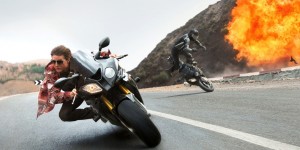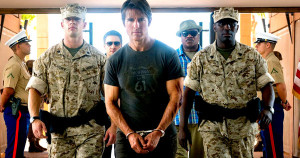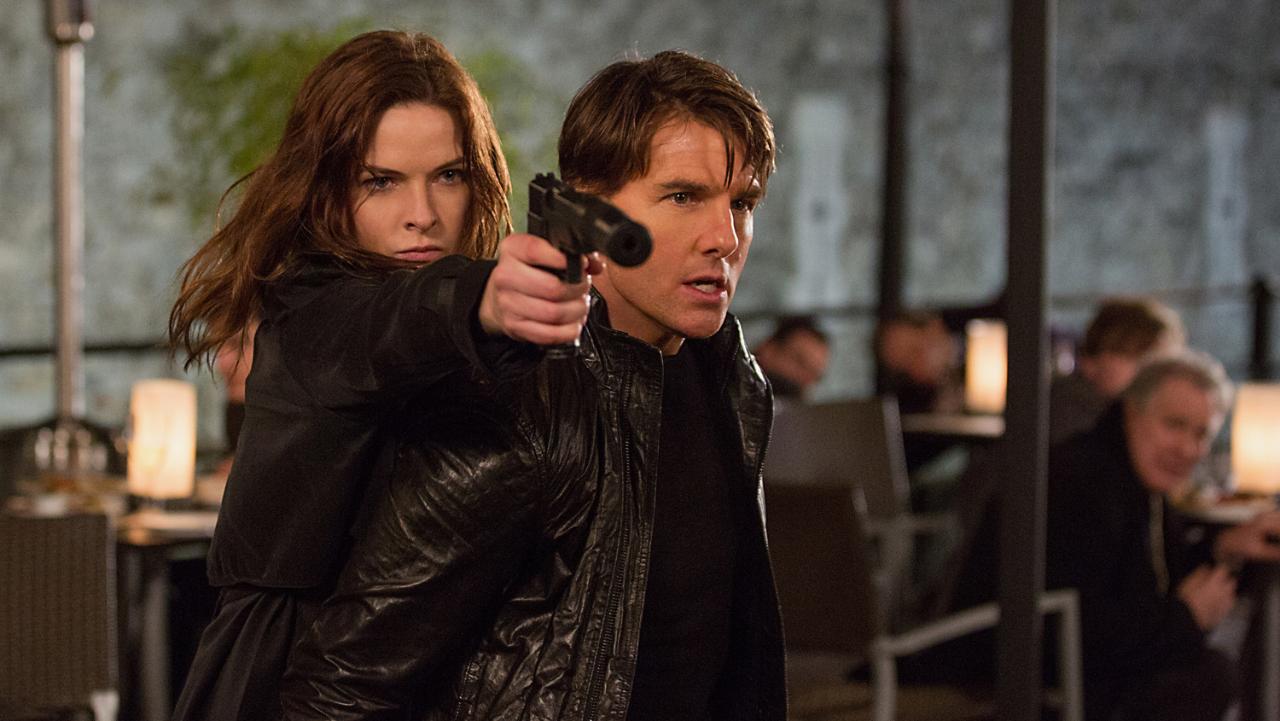By Kyle Huffman.
Every action movie relies on the audience’s suspension of disbelief regarding the humanity and dexterity of its star. Some, like Arnold Schwarzenegger and Sylvester Stallone, portray themselves as tank-like monuments of granite that through sheer force of will annihilate all in their path. Others, like Bruce Willis or Jason Statham, accomplish the mission by the skin of their teeth just as they crack a grin for the camera and offer up a self-aware one-liner. The shelf life of an action star is relatively short, as the inevitability of “the next big thing” frequently forces said performer to stretch themselves too thin. Regardless, all of these aforementioned action icons teamed up last year for the overstuffed nostalgia act deemed The Expendables 3 (2014), in which each of the former stars tried to spark a collective light that for all had faded years ago.
 Tom Cruise, on the other hand, is still lighting up the silver screen as bright as ever in the latest addition to the Mission: Impossible series, Mission Impossible – Rogue Nation (2015). Three decades into his stardom, Cruise looks like he is running his marathon of a career at a sprinter’s pace, with no signs of letting up. While the actor won over audiences with his unrivaled intensity and charisma, the aging performer has seemingly decided that his future in movies will rely on his ability to outwit and outlast the action genre’s ever rusting titans. Amidst outside controversies regarding Cruise’s faith and personal life, the nearly twenty year old franchise has allowed the actor to channel his dramatic energies into proving he is more than an embarrassing headline on your supermarket’s run-of-the-mill tabloid.
Tom Cruise, on the other hand, is still lighting up the silver screen as bright as ever in the latest addition to the Mission: Impossible series, Mission Impossible – Rogue Nation (2015). Three decades into his stardom, Cruise looks like he is running his marathon of a career at a sprinter’s pace, with no signs of letting up. While the actor won over audiences with his unrivaled intensity and charisma, the aging performer has seemingly decided that his future in movies will rely on his ability to outwit and outlast the action genre’s ever rusting titans. Amidst outside controversies regarding Cruise’s faith and personal life, the nearly twenty year old franchise has allowed the actor to channel his dramatic energies into proving he is more than an embarrassing headline on your supermarket’s run-of-the-mill tabloid.
While I hold out faith that Cruise will eventually return to more daring dramatic work, his signature brand of action films are their own form of meta-textual commentary of a man running from a world always threatening to brand him obsolete. But as Alec Baldwin’s CIA chief Alan Hunley confides, Ethan Hunt (and by extension Cruise) is “the living manifestation of destiny.” This level of godlike power embodies everything the genre is about. Making the human superhuman is a popular motif of culture right now, giving rise to the current global trend of superheroes. But Cruise does not need a cape to prove his abilities as a screen hero. His unshakable will ensure the villains’ defeat before the opening credits of Rogue Nation begin to roll.
 Sure, there is the usual team of IMF agents who “assist” Ethan Hunt in combating an omnipotent, renegade spy agency known as the Syndicate. But anyone familiar with the series knows that these supporting players are only around to insist on the mission’s impossibility while Hunt runs headfirst into danger with a unique brand of self-righteous ignorance. Ving Rhames provides the old, reliable muscle while Simon Pegg offers up some playful banter to compliment his technical expertise. Jeremy Renner and Baldwin are almost exclusively restricted to sparring with one another in stuffy courtroom settings regarding the IMF’s ethical standing. But rest assured, as both the poster and trailer promise, Cruise is the only cast member willing to strap himself to the side of an airplane as it leaves the runway.
Sure, there is the usual team of IMF agents who “assist” Ethan Hunt in combating an omnipotent, renegade spy agency known as the Syndicate. But anyone familiar with the series knows that these supporting players are only around to insist on the mission’s impossibility while Hunt runs headfirst into danger with a unique brand of self-righteous ignorance. Ving Rhames provides the old, reliable muscle while Simon Pegg offers up some playful banter to compliment his technical expertise. Jeremy Renner and Baldwin are almost exclusively restricted to sparring with one another in stuffy courtroom settings regarding the IMF’s ethical standing. But rest assured, as both the poster and trailer promise, Cruise is the only cast member willing to strap himself to the side of an airplane as it leaves the runway.
These summations of Rogue Nation (and by extrapolation the Mission: Impossible series) are not necessarily a critique. Rather, Cruise’s insistence to push the bar as an action star at the ripening age of fifty three is a testament to the actor’s ability to retool the franchise’s stylistic and narrative aims film to film while continuing the series’ commitment to over-the-top, inventive set pieces. Other franchises like James Bond, Fast and the Furious, and The Terminator are beholden to faceless corporate overlords who make no qualms about putting box office returns first and quality second. Here, Cruise is the overarching auteur, entrusting every new film to his handpicked director’s own sensibilities. This go around, Cruise enlisted the help of Hollywood journeyman Christopher McQuarrie, who helmed Cruise in the lean and effective Jack Reacher (2012).
Cruise and McQuarrie continue their collaboration successfully, crafting a story for Rogue Nation that makes up for what it lacks in freshness with economy. The globetrotting adventure finds Hunt and company struggling to keep up with the Syndicate’s soft spoken but ruthless mastermind Solomon Lane (Sean Harris) in a variety of locales: London, Vienna, and Casablanca. Each new stop features a set piece more memorable than the last, with creative uses being made of opera houses, underwater security servers, and anonymous Moroccan roads perfect for high speed motorcycle chases. None of these sequences overstay their welcome, as McQuarrie keeps the plot calibrated with the precision of a Swiss watch. The director, like his predecessor Brad Bird on Mission: Impossible – Ghost Protocol (2011), fashions Rogue Nation as an unabashed throwback to Connery-era Bond, in which the audience found the illogical gadgetry and unflappable masculinity as charmingly escapist rather than overtly flaky. The stakes may be high but the results are never in doubt.
This biggest surprise of Rogue Nation, though, is that Cruise does not have to do all the heavy lifting himself. Newcomer to the series Rebecca Ferguson, playing the remote and shady double agent Ilsa Faust, seems to be the franchise’s first worthy female equal (and at points superior) to Cruise. Upgrading on previous attempts by Keri Russell and Paula Patton, Ferguson grounds a character who could have easily been forgettable or half-baked into a worthwhile ally (or foe) to Cruise’s Hunt. Like Hunt, Faust never fails to perform the job at hand, while all those on the sidelines are busy making their impassioned pleas or witty remarks. The film hints to, but never enforces, a romantic subplot, which was a welcome change of pace. Faust is allowed to exist on her own terms, not merely as a foil for Hunt but as a legitimate and unpredictable threat to the West’s security.
 Unfortunately, the film’s ultimate threat lays with the Syndicate’s Lane, another relatively bland, European rogue whose chaotic goals know no national bounds. Rogue Nation, like many spy films, has a villain problem. Calculated revenge, without proper amplification, can make the adventure more of a slog. Simply showing up is not the same as giving your hero a worthy effort. The circumstances of the set pieces’ choreography, rather than Lane’s reach or psychology, pose the greatest threat to Hunt’s life. Until the Mission: Impossible series finds an enemy that lives up to the third movie’s terrifically memorable turn by Philip Seymour Hoffman, it looks like this tradition of mediocrity will continue. Still, on every other front Rogue Nation feels like the quintessential entry in the Mission: Impossible series. You will be hard pressed to find a fifth installment as taut and entertaining as this one.
Unfortunately, the film’s ultimate threat lays with the Syndicate’s Lane, another relatively bland, European rogue whose chaotic goals know no national bounds. Rogue Nation, like many spy films, has a villain problem. Calculated revenge, without proper amplification, can make the adventure more of a slog. Simply showing up is not the same as giving your hero a worthy effort. The circumstances of the set pieces’ choreography, rather than Lane’s reach or psychology, pose the greatest threat to Hunt’s life. Until the Mission: Impossible series finds an enemy that lives up to the third movie’s terrifically memorable turn by Philip Seymour Hoffman, it looks like this tradition of mediocrity will continue. Still, on every other front Rogue Nation feels like the quintessential entry in the Mission: Impossible series. You will be hard pressed to find a fifth installment as taut and entertaining as this one.
Kyle Huffman is a recent graduate of the University of North Carolina Wilmington where he earned a Bachelor’s Degree in Film Studies.


